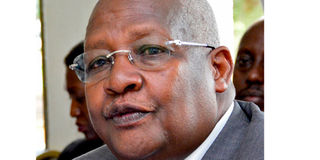Kutesa named in Shs1.8 billion business bribery case

Foreign Affairs minister, Mr Sam Kutesa
What you need to know:
- Ho’s Ugandan scheme was allegedly hatched in the halls of the United Nations in New York, when Mr Kutesa served as the President of the U.N. General Assembly
- Acting Assistant Attorney General Kenneth A. Blanco said the Criminal Division would investigate and prosecute corrupt individuals who put at risk a level playing field for corporate competitiveness, regardless of where they live or work
Kampala- Foreign Affairs minister, Mr Sam Kutesa has been named in US court documents as having allegedly received a $500, 000 (about Shs1.8 billion) bribe to help a Chinese energy company secure business advantages in Uganda, including the potential acquisition of a Ugandan bank.
Relatedly, President Museveni allegedly received gifts.
According to a November 20 statement by Joon H. Kim, the Acting United States Attorney for the Southern District of New York, Kenneth A. Blanco, Chi Ping Patrick Ho, aka Patrick C.P. Ho and Cheikh Gadio, Senegal’s former Foreign Minister, allegedly paid the bribe.
According to the complaint, the contact between Mr Kutesa and HO started in 2014 when they met at the UN in New York.
Then, HO, claiming to be acting on behalf of the Energy NGO, discussed a strategic partnership between Uganda and the Energy Company.
The company was to engage in various business ventures, which would be formed once Mr Kutesa completed his term as President UNGA and returned to Uganda.
Mr Kutesa returned to Uganda in 2015, just ahead of Uganda’s 2016 general election.
According to the complaint, in or about February 2016, after Mr Kutesa had resumed his role as Uganda’s Foreign minister, he solicited “a payment from HO, purportedly for a charitable foundation that he wished to launch”.
“HO caused a $500,000 payment to be wired to an account in Uganda designated by the Ugandan Foreign Minister, through a bank in New York. In his communications, HO variously referred to this payment as a “donation” to the reelection campaign of the President of Uganda (who had already been reelected) and as a “donation” to “support” the Ugandan Foreign Minister,” says the statement.
Attempts to reach Mr Kutesa have so far failed.
The U.S. Attorney’s Office of Southern District of New York says the charges contained in the complaint are merely accusations.
It says the defendants HO and Cheikh who were arrested on Friday and Saturday respectively are presumed innocent unless and until proven guilty.
HO, 68, of Hong Kong, China, and GADIO, 61, of Senegal, are each charged with conspiring to violate the FCPA, violating the FCPA, conspiring to commit international money laundering, and committing international money laundering.
The maximum penalties for these charges are as follows: five years in prison for conspiring to violate the FCPA; five years in prison for each violation of the FCPA; 20 years in prison for conspiring to commit international money laundering; and 20 years in prison for each charge of committing international money laundering.
The maximum potential sentences in this case are prescribed by Congress and are provided here for informational purposes only, as any sentencing of the defendants will be determined by the judge.
Away from the claims against him in the US, Mr Kutesa is no stranger to controversy.
In 2011, the then Youth Member of Parliament for Western Uganda, Gerald Karuhanga, claimed that Mr Kutesa and Hilary Onek, Energy minister then – had received money from Tullow Oil to grant the company favours in the oil deals in Uganda.
Mr Karuhanga claimed that Mr Kutesa had received a 17.5 million euros and Mr Onek an equivalent of about 5.6 million euros.
The Uganda Radio Network reported then that Mr Mbabazi benefitted financially when he facilitated, as Security minister, a meeting between Tullow Oil and Eni, an Italian Oil Company, to get oil deals.
The ministers pleaded innocent.
Parliament would later institute an ad hoc committee to investigate the ministers.
After months on investigating the matter, the committee cleared the ministers, saying there was no evidence they received bribes.




